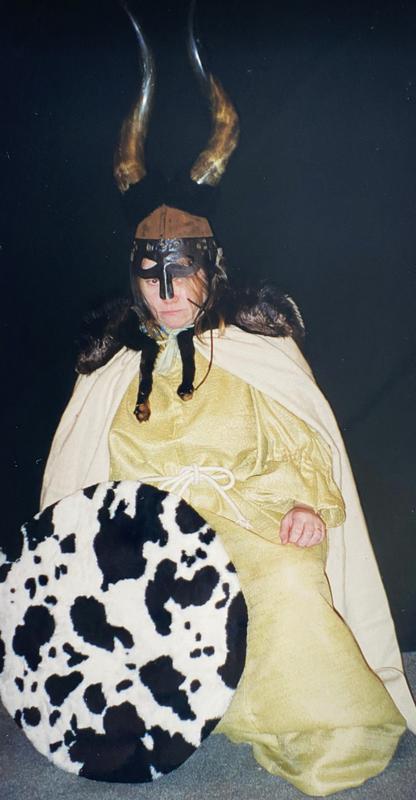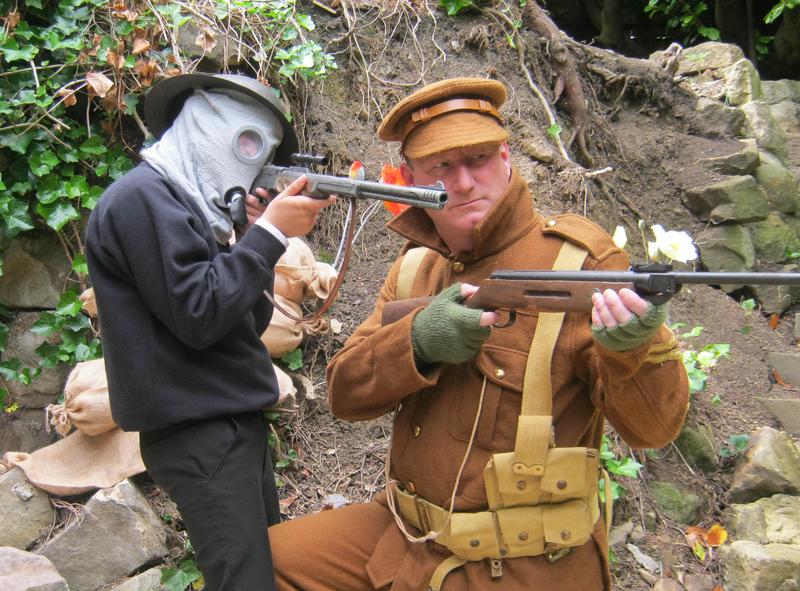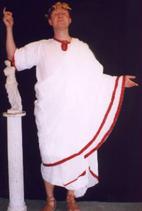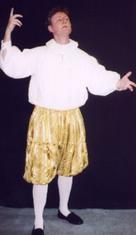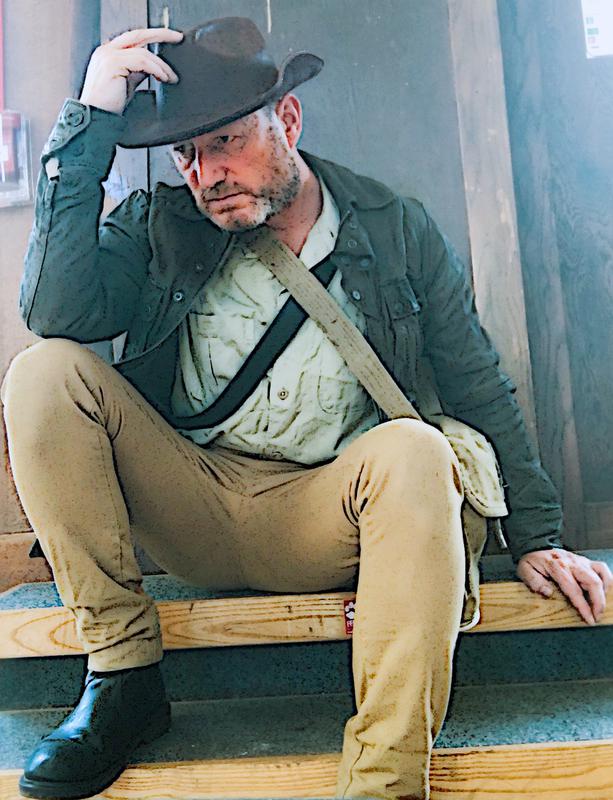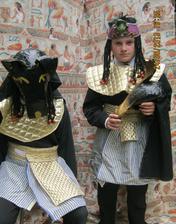Rock Up with the Early Britons;
Stone Age / Bronze Age / Iron Age Man
We meet Indiana Bones, a modern-day archaeologist who takes us on a journey through the Stone age, the Bronze age and the Iron age. He dresses some children in each period to demonstrate what clothes they wore and how clothes and decorative jewellery developed. There is a simple song as we travel through each time period and in the Iron age, we meet Boudicca and her daughters and two Druid Priests. There are many artefacts and simple tools from each period as well as many animal skins to show. The show culminates in a parade followed by a human timeline to show the developments through time.
Vikings Gods and Myths
We meet Valiant, a Viking settler and trader, who invites the children into his home and tells them a brief history of the Viking people and why they came to Britain. He then attempts to sell his wears, such as furs and helmets and drinking horns to the highest bidder.
He intends to travel further afield to sell more of his wears but before he goes he tells the children about Viking beliefs and about the 9 Viking Worlds.
He then decides to tell the children the story of Thor's Hammer and chooses some children to act out the various roles dressing them in appropriate costumes. After that he teaches the children a Viking drinking song and the show concludes with a Viking Victory dance.
NEW Boudicca - Romans in Britain
We meet Boudicca, the Celtic Queen of the Iceni tribe, who tells us of the Roman occupation of Britain. She gives us an insight into life in Celtic Britain, and of the Roman invasion. She tells of her Rebellion against the Roman invaders and dresses two children as Celtic and Roman warriors respectively. Children will also be taught a Druid chant and a celebratory dance.We meet Angela the Archaeologist who teaches the children how life has changed in Britain from the Stone age to the Iron age. She will tell them about Early Mans life, society, beliefs and the start of early farming. We will look in detail at the building of Stone Henge and the ancient site of Skara Brae. Using child involvement, replica artefacts and costumes this difficult period will be bought to life in a fun and memorable way.
All rights reserved. Tempus Fugit Educational Theatre
Invaders and Settlers
Anglo-Saxons (Beowulf)
We meet Sven, an Anglo-Saxon settler who invites the children into his dwelling and tells them of the new terror of the Viking warrior invasions. He then tells us of the epic tale of Beowulf. Children will be chosen to dress up in costume and take part in the dramatic storytelling workshop of Beowulf involving percussion instruments, dance, song, an atmospheric setting... and the use of your imagination!
Invaders and Settlers
Romans (Romulus and Remus)
We meet Claudius, a statue, who, with the help of the children, re-enacts the Roman myth of Romulus and Remus and the Foundation of Rome. By enacting the story, the children are given glimpses into Roman life and society. Some children will be given the opportunity to dress up in Roman costume, act out parts in the play, and join in a Roman march. All children will be taught a Latin Song.
We meet Maximus Aurelius a Roman armourer and market trader as he creates new armour for the Gladiators. He talks about his life in the Romano British town of Castrum Deva Victrix (modern day Chester). We learn about the daily routines, past times and customs and get a glimpse of what life was truly like under Roman rule. Some children will be dressed in costume and all will join in a Roman song to bring this period to life in a fun and interactive way.
1066 and the Norman Conquest
Robert de Winter, a Norman Knight and Lord, is just back from fighting the Vikings in the North. He is busy compiling the Doomsday Book, recording the full extent of King William’s new kingdom.
He tells the children about the Battle of Hastings and the events leading up to the Norman Conquest of Britain.
Some children will be dressed in costume and enrolled as Robert’s helpers to bring this important period of History to life in a fun and entertaining way.
To commemorate the centenary of the start to World War 1 in 2014 our brand new show is a thought provoking and evocative play to give you a glimpse into the life of a soldier in the trenches during World War 1.
This show involves plenty of child involvement to include; dressing up and marching, and performing routine tasks and drills. Everyone will participate in singing a variety of well known World War I songs. This show is relevant to both Key Stage 1 and Key Stage 2 audiences.
Other Literacy Shows for Key Stage Two;
A Midsummer Night's Dream
William Shakespeare, playwright and director at the Globe Theatre, London, is late for his rehearsal. Catch a glimpse of Elizabethan life and theatre though his eyes. He mistakes the children for his actors and involves them in the action of two scenes from his latest play; "A Midsummer Night's Dream", giving us an insight into his craft. Children will also be taught Puck's song "Where the Bee Sucks there suck I" and they will perform the dance of the Fairy's. The show provides a wonderful introduction to Shakespeare for children of all ages.
Early Civilisations
Ancient Egypt
We meet either Andrew or Angela the Archaeologist who has just discovered Tutankhamen's tomb. Then we travel back in time and meet Nebamum, an ancient Egyptian Architect who is in the process of building a tomb for Tutankhamen, the current Pharaoh of the land. He gives us an insight into his craft and tells us about different aspects of everyday life in Ancient Egypt. Some children will have the opportunity to dress up in Egyptian costume, others in an Egyptian mask. There will be an Egyptian song, an Egyptian dance, and an Egyptian game.
NEW The Greeks (Medusa)
A light hearted look at the Greek civilisation and Greek theatre using masks, costume, music, dance and dramatic interpretation as an insight into life in Ancient Greece. Four children will be chosen to take the lead roles of Perseus, King Polydectes, the Goddess Athena and Medusa.Other children will be required to make up the Greek chorus and others, the musicians for a retelling of the legend of Medusa.Opportunities are provided for children to try on masks and costumes and take part in a dramatic poem and a dance of the period.
